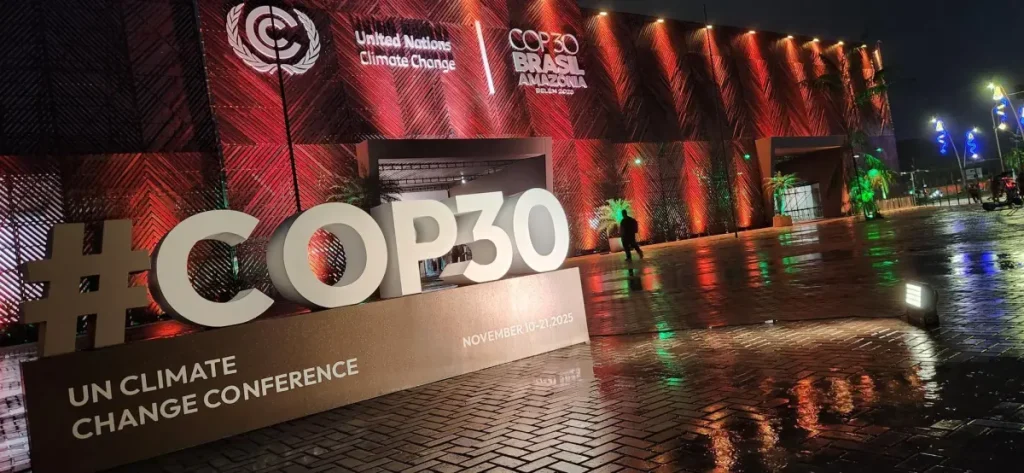Fossil Fuel Industry’s Growing Influence at Global Climate Talks
The COP30 climate talks in Belém, Brazil have once again highlighted a troubling reality in the global effort to address climate change: the overwhelming presence of fossil fuel industry representatives. According to a recent analysis by the Kick Big Polluters Out coalition, more than 1,600 fossil fuel lobbyists have gained access to these crucial climate negotiations. This staggering number means that approximately one in every 25 participants at the conference represents the very industry whose emissions are driving the climate crisis. Even more concerning is that these lobbyists collectively outnumber the delegations from nearly all participating countries, with only host nation Brazil having a larger presence. This disproportionate representation raises serious questions about whose interests are truly being served at these talks, which are ostensibly designed to accelerate climate action and protect vulnerable communities worldwide.
The scale of fossil fuel industry representation at COP30, while slightly lower in absolute numbers than at last year’s COP28 in the United Arab Emirates (which saw over 2,400 industry representatives), actually represents a higher proportion of total attendees. This growing influence comes at a particularly poignant moment, as the Philippines—home to coalition member Jax Bongon—was being devastated by super typhoon Fung-wong just as the climate talks began. The increasing intensity of such storms has been linked by climate scientists to warming ocean temperatures caused by carbon emissions. “It is infuriating to watch their influence deepen year after year, making a mockery of the process and of the communities suffering its consequences,” Bongon stated, underscoring the disconnect between the urgent reality of climate impacts and the political dynamics within the negotiation halls. His frustration echoes a sentiment shared by many climate advocates: “It’s common sense that you cannot solve a problem by giving power to those who caused it.”
The coalition’s analysis reveals that fossil fuel representatives have secured access through multiple channels. Many are embedded within official country delegations, while others gain “behind the scenes” access through special badges that allow them to observe and potentially influence the inner workings of the negotiations. Trade associations serve as another major vehicle for fossil fuel industry participation, with the International Chamber of Commerce (ICC) singled out for bringing 148 representatives to COP30. When questioned about these findings, Andrew Wilson, deputy secretary-general for policy at ICC, disputed the characterization, claiming that only three of their 148 members represent fossil fuel companies. Wilson defended the ICC’s approach, stating they are “absolutely committed” to the Paris Climate Agreement and see fossil fuel companies as “a vital part of that journey given our energy needs.” This perspective, however, stands in stark contrast to the views of climate activists who see the industry’s involvement as fundamentally compromising the integrity of the process.
The fossil fuel industry’s influence at climate talks has been a contentious issue for years, but recent research suggests the problem may be more systematic than previously understood. A comprehensive report released in October by the Climate Social Science Network identified more than a dozen tactics through which industry actors can effectively obstruct progress in climate negotiations. The researchers concluded that such obstruction “has become a defining feature” of the United Nations climate process. What makes this particularly problematic is that these tactics are often “subtle and context-specific,” making them difficult for negotiators, observers, and civil society to identify in real time—and even harder to counter effectively. This sophisticated approach to influence has allowed the industry to maintain its power within the climate policy arena despite growing public pressure for more ambitious climate action.
The frustration with this situation extends beyond environmental organizations to some political leaders. U.S. Senator Sheldon Whitehouse, a Democrat from Rhode Island and a prominent voice for climate action, expressed his exasperation before COP30 began. “We’ve been too nice about this for too damn long,” he said, accusing the fossil fuel industry of perpetrating “climate denial fraud” for decades. He identified the industry’s “dark money corruption” as the most significant obstacle to meaningful climate progress. Senator Whitehouse’s comments reflect a growing recognition among climate advocates that addressing the structural power of the fossil fuel industry may be as important as the technical aspects of climate policy if the world is to achieve the goals set out in the Paris Agreement.
As the COP30 climate talks continue, the disproportionate presence of fossil fuel lobbyists serves as a stark reminder of the political challenges that lie at the heart of the climate crisis. While technical solutions to reduce emissions exist and renewable energy alternatives continue to advance, the question of who has a seat at the decision-making table—and whose interests are prioritized—remains critical. The Kick Big Polluters Out coalition and other climate justice organizations are calling for reforms to protect the UN climate process from what they term “corporate capture.” Their analysis of lobbyist participation at COP30 adds weight to their argument that meaningful climate action requires not just technological innovation or policy commitments, but a fundamental rebalancing of power away from the industries most responsible for the crisis and toward the communities most affected by it. As super typhoons, wildfires, floods, and other climate impacts intensify around the world, the stakes of this power struggle could not be higher.


